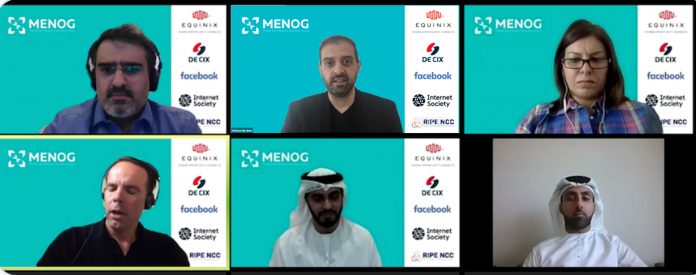
- First online edition of meeting served as strategic platform to discuss how COVID-19 impacted Internet operations in the Middle East
- 378 people from 48 countries tuned in for the meeting
The 20th edition of the Middle East Network Operator Group Meeting and Peering Forum (MENOG) was held as a virtual event recently. The meeting took place as a 90-minute panel discussion and was broadcasted live on MENOG’s website.
During the meeting, panelists from across the region discussed the effects of COVID-19 on the Middle Eastern Internet. The panel featured Nermine El Saadany, Regional Vice President for the Middle East at Internet Society; Abdul Rahman Al Marzouqi, Director Cyber Security at United Arab Emirates Telecommunications Regulatory Authority; Marco Brandstaetter, Regional manager at DE-CIX and manager of the UAE-IX; Ahmed Ali, Vice President at Cyware Labs; Taha Hussain, Sr. Product Solutions and Capacity Management at Batelco and was moderated by Hisham Ibrahim, External Relations Manager at the RIPE NCC.
The event’s key topics included emerging ICT policy regulations, handling the unexpected increase in Internet traffic and trusting e-services as necessities.
Highlights:
Nermine El Saadany reported that Oman, among other Gulf countries, lifted their ban on Voice over IP applications such as Zoom or Google Meet. She also mentioned that Middle Eastern governments worked with social media companies in an effort to reach out to younger generations and fight misinformation about COVID-19.
Abdul Rahman Al Marzouqi shared that the United Arab Emirates eased up regulations on all important e-services such as online meeting and e-medicine applications and collaborated with different Internet stakeholders to facilitate a better Internet access across the country.
Marco Brandstaetter mentioned that Frankfurt IX registered a 10% traffic uptake (from 8TB to 9TB) when COVID-19 hit Europe and the Middle East. However, he added that Internet Exchanges Points are built for growth and could handle sudden spikes in traffic. He also saw a great push of traffic towards the UAE-IX with 300 to 400 gigabits recorded in Dubai compared to 100 gigabits for the previous year.
Taha Hussain reported a 50% increase in uplinks in Bahrain. He explained that his company had to roll out a lot of fiber optic cables to residential areas to keep up with the demand and subsequently saw a shift from mobile to fixed networks over the quarantine period.
Ahmed Ali shared that his company observed a rise in cybercriminal activities in the region during the crisis. This ranged from simple phishing attacks to complex organised cybercrime. He also pointed out that since the start of the pandemic there was greater collaboration between the public and private sectors on sharing intelligence about cyber threats.
Hisham Ibrahim said: “COVID 19 has brought to light some of the core operational and regulatory issues that MENOG has been tackling for years in the region. While COVID 19 caught the whole world by surprise, those that were most prepared to deal with it were those that had been deploying the best collaborative and interconnectivity practices. Through MENOG 20, we were able to reflect on the impact of COVID-19 on the Middle Eastern Internet and gain insight on how different stakeholders in the region handled the crisis. However, the work in the region is far from done and we at MENOG are happy to work with those interested on getting themselves ready.”
The meeting concluded with some recommendations: promoting adaptive policy regulations, championing innovation, accelerating government digitisation, developing a better Internet infrastructure, fostering collaboration and harmonising cyber laws within the region.
MENOG 20 lived up to its reputation as an open event for the entire technical community to exchange experiences and lessons learnt from sectors such as Internet service providers, mobile operators, content providers, cloud and infrastructure service providers, as well as government regulators, academics and key business decision makers. A range of industry organisations sponsored the meeting including: Equinix, DECIX, Facebook, Internet Society and the RIPE NCC.


































